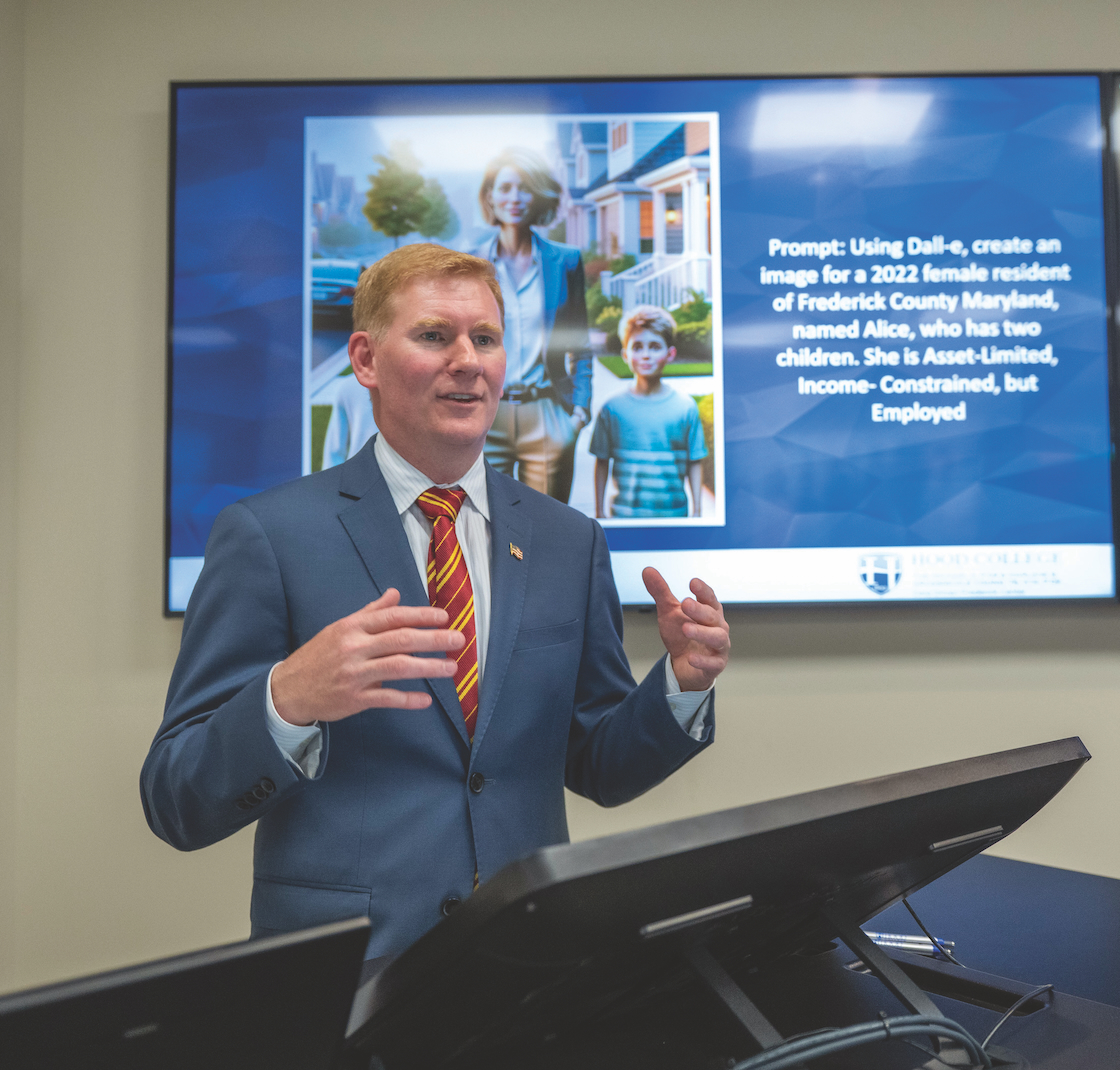Exploring the Benefits and Risks of AI

Insights from David Gurzick, M.S.’03, Ph.D.
Hood Magazine Fall 2024
Department
- The George B. Delaplaine Jr. School of Business
David Gurzick, M.S.’03, Ph.D., is the director of The Michael S., P’09 and Marlene B. Grossnickle Young ’76, H’14, P’09 Data Driven Frederick Center. As a professor of management science at Hood, he offers courses in the management of information systems, analytical methods, socially responsible management and, most recently, artificial intelligence (AI). Generative AI, which democratizes access to machine intelligence, has the potential to fundamentally reshape business processes at all levels and across all industries. This transformative technology is also the focus of the Graduate School’s first Skill Accelerator digital badge course, which Gurzick taught in summer 2024.
How did you get into the field of AI?
My journey into AI began during my master’s in computer science here at Hood in 2003. I took every AI course available, including a special topics course on genetic algorithms. My work in handwriting recognition caught the attention of one of my professors, leading to an introduction to some venture capitalists. This connection resulted in the founding of Sonum Technologies, where I became the first employee. Sonum specialized in natural language processing, language translation and speech recognition—as I like to say, AI before AI became cool. Our work was even featured on the front page of The Baltimore Sun.
What is the current focus of your research?
My research primarily focuses on understanding and designing social computing technologies—the systems and communities where we discover, interact, share and create. Increasingly, AI is being infused into social computing, both by the platforms themselves and in tools used to automate interactions on these systems. Recently, I published an article for the Information Professionals Association, discussing how non-state actors are using generative AI to inject and spread disinformation on social media platforms like TikTok. This research led to discussions with Senator Mark Warner’s office about potential regulations for social media algorithms.
Tell us about the new Applied Generative AI Skill Accelerator course you’re teaching.
Our new course, Applied Generative AI, is designed to explore the strategic application of generative AI in driving innovation and value creation across various business domains like healthcare, government, marketing and finance. Students will learn to leverage generative AI techniques to solve real-world problems and optimize processes within organizations, exploring the theoretical foundations of how these systems work and how the mechanics behind them can be customized toward particular use cases. This is also the first digital badge we’re offering from the Graduate School, reflecting the growing importance of AI skills in today’s job market.
What are the biggest opportunities for leveraging AI in business?
AI, particularly generative AI, has the potential to fundamentally reshape business processes at all levels and across all industries. The impact of AI on business is comparable to the revolutionary changes brought about by the emergence of the internet, which gave rise to e-commerce and a myriad of online services. We’re at a similar inflection point with AI.
One of the most exciting aspects of AI is its potential as a great leveler for businesses of all sizes. As we discussed at the Downtown Frederick Partnership Small Business Forum, mom-and-pop shops can now create marketing plans, customer service chatbots and data analysis that would have been unattainable without corporate-level budgets just a few years ago. This democratization of advanced capabilities is opening up new opportunities for small businesses to compete on a larger stage. The key is to identify areas where AI can augment human capabilities, allowing us to focus on more strategic and creative tasks.
How is Hood harnessing the power of AI to improve outcomes for students?
At Hood, we’re integrating AI across many aspects of our programs to enhance student learning and prepare them for an AI-driven future. Our new Applied Generative AI course is a prime example, offering students hands-on experience with cutting-edge AI technologies. We’re also examining how AI can improve various aspects of the student journey, from the admission process to assignment feedback.
Through Data Driven Frederick, our community analytics lab, students get real-world experience applying AI to local challenges. This not only reinforces classroom learning, but also demonstrates AI’s potential for positive community impact.
We’re continually exploring innovative ways AI can enhance the learning experience, streamline administrative processes and equip our students with the skills demanded by the evolving job market. Hood is committed to leading the way in responsibly integrating AI to improve student outcomes and experiences.
What are the risks and limitations of AI? How should we address these concerns?
While AI offers exciting possibilities, it also presents a host of serious risks. AI can spread misinformation, it can depersonalize workplace interactions, and it can perpetuate biases that lead to unfair outcomes.
It’s going to take a multi-pronged approach to tackle these issues. This includes creating strong regulations to surface and combat misinformation, coming up with norms for balancing AI and human interaction at work, and ensuring AI systems are transparent and audited to minimize bias. But perhaps the most important thing we can do is educate everyone about the opportunities and limitations of AI.
This is where Hood can take a leading role—by preparing those who can lead this dialogue. To do this, we must equip students with the skills and knowledge to navigate these challenges responsibly and shape AI’s future. By incorporating relevant assignments and projects into our coursework, we can ensure that our students are well-prepared to develop solutions that harness AI’s potential while addressing its risks.
Are you ready to say Hello?
Choose a Pathway
Information will vary based on program level. Select a path to find the information you're looking for!
